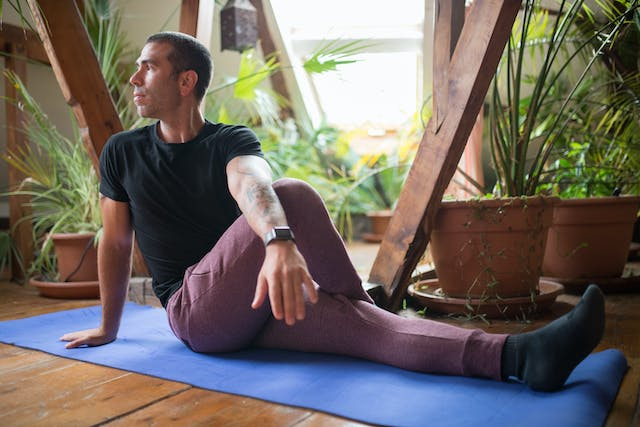
These are the Best Yoga for Constipation Strategies and Poses
Time to read 4 min
Time to read 4 min
While diet, medication, and lifestyle changes are important, you should also focus on flexibility and stretching for constipation relief. This can be performed through yoga, which is a generational gift passed down through the ages.
Our traditions contain some of the best poses and strategies for digestive improvement, nervous system strengthening, circulation boosting, and focus-enhancing. You can perform a range of mudras while holding certain poses, which can help you develop a stronger connection with your body's systems.
You can add these yoga poses to your daily mobility activities to help improve your bowel movement and digestive functioning.
In vajrasana you can sit back on your knees with your feet flat on the ground. This pose can relax your spine and allow your stomach to relieve gas without significant pain. You can gradually work your way from sitting on your toes to eventually sitting on your heels.
This is a specifically designed wind relieving pose which is ideal for people for all ages. You can lie flat on your back and then curl your head and knees inwards, and hug your knees. This can relieve pressure from your stomach and provide more circulation to your lower bowels.
This is one of the best yoga poses to improve circulation and enhance bowel movements. You can also lie flat on your stomach and raise the left leg in the pose to improve the stretch and feel it in certain parts of the lower abdomen.
The bow pose is another great way to relieve gas and a quick way to improve your digestive system. You can also fold your extended leg inward to experience a deeper stretch as well.
There are a range of reasons why yoga is beneficial for constipation, which is why you should add it into your daily life, for even 10-15 minutes. You don't need to carve out a significant amount of time for the session, as just a consistent 10-15 minutes practice should help you.
With the right poses, you can de-load certain digestive processes by shifting the stretch. You can add focus through breath-work, and improve the functioning of the system.
You can add more blood flow to different parts of the digestive system to treat chronic constipation. Better circulation can also help in relieving constipation symptoms, which is especially important for stomach disorders.
You can unwind and de-stress from the day by focusing on the poses and how your feet touch the yoga mat. There are also a range of yoga poses for constipation which improve focus and relax the mind as well.
It is important to know the precautions prior to engaging in yoga practices, especially to cure constipation or to relieve pressure on abdominal organs. You should also consult with your doctor if you have an injury or are managing joint issues.
You should focus on static and dynamic stretching when starting yoga. Some of the more challenging poses, such as cobra pose and bow pose, need a level of flexibility to prevent pressure on the digestive organs.
Yoga is a great way to strengthen the abdominal muscles and to improve the overall functioning of the digestive system. It is important to start slowly and gradually increase the difficulty of the poses over time.
When starting off a yoga session or lifestyle change, you should consult with your doctor about how it can affect certain conditions, diseases, or joint-related issues.
Yoga poses can be helpful only when there is an awareness present of any injuries or areas of weakness in the body. You can focus your attention towards these areas to ensure that you're preventing any further stress.
If you have irritable bowel syndrome or other digestive tract issues, then you should stop when you have discomfort. You should be in touch with your body, rather than force it to go through a range of strenuous poses.
Breathing is one of the most aspects of yoga for relieve constipation. You can improve your blood circulation, focus, and strength by breathing all throughout the yoga session.
You should be careful of these signs of constipation, so that you're prepared if there is escalation in the symptoms.
Gas is one of the main signs of constipation, as it can be present before or after meals.
You can experience painful bloating around the abdominal area, with a general sense of irritability.
A nausea sensation is another sign that you may have a constipation related issue present.
Vomiting without any other condition or issue, can be a sign of constipation.
You can experience irregular stools or issues with regular bowel movements.
Pain can be a critical sign that there may be something wrong with your bowel movements.
Severe cramping is another sign that you should be careful with your constipation symptoms.
* Medical Disclaimer - This information is for educational purposes only. No information provided on this website, including text, graphic, and images, are intended as substitutes for professional medical advice. Please consult with your doctor about specific medical advice pertaining to your condition(s).


